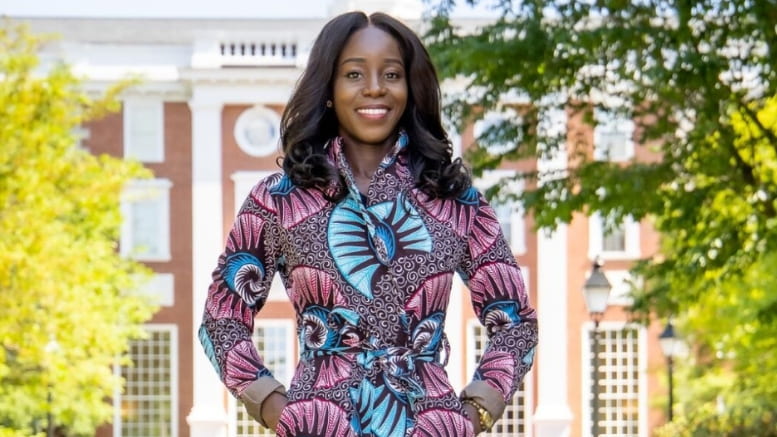Ask Nikki Okrah ’11 about her five-year-old entrepreneurial venture, Chaku Foods, and her response avoids the typical business lingo trumpeting point of differentiation and margins.
Instead, Okrah begins speaking about a mother named Helina in Ghana, a West African nation of some 32 million residents. Helina never attended high school and acquired a few acres of agricultural land through marriage.
With passion and optimism, Helina says that land is unlocking access to educational opportunities and brighter prospects for her seven children – and Chaku, Okrah’s fast-moving company driving sustainable agricultural solutions for Ghanian farmers, is helping that happen.
“When we talk at Chaku about creating farmer wealth and climate friendly solutions, she’s the perfect example of that,” Okrah says of Helina. “Generational wealth in thriving agricultural communities, that’s what we’re after.”
Finding her path
Admittedly, Okrah didn’t envision this life when she enrolled at Northwestern in 2007, attracted to the University’s academic reputation, diverse courses, and the Herskovits Library of African Studies, home to the world’s largest Africana collection. In fact, Okrah, who spent her formative years between Massachusetts and Ghana, planned to pursue a career in finance.
Almost immediately, however, Weinberg College’s liberal arts environment opened her eyes to compelling alternatives. A first-year seminar exploring the wealth of different nations spurred curiosity about economics while international relations topics piqued her interest as well.
And gradually, organically, Okrah’s plans shifted over the remainder of her undergraduate years.
She interned at Google and studied abroad in Spain, learning to think more about community and culture than career and compensation. She earned a Posner Fellowship to conduct a self-directed research study on kinship ties in Ghana and, later, an undergraduate research grant to further that work examining remittances back home in Ghana.
When Okrah graduated in 2011, pairing a political science major with minors in business institutions and African studies, she moved to San Francisco and joined Visa’s New Graduate Development Program.
Learning about Visa’s global initiatives, Okrah lobbied for a position in Johannesburg. Over nearly two years, she developed analytics and strategy for projects across Sub-Saharan Africa, including opening new electronic payment channels. The endeavor provided Okrah an entrepreneurial experience within the structure of an established organization. It also sparked a formative observation, one that would later drive the founding of Chaku.
“Why aren’t farmers on the continent sharing in the growth clearly visible from Visa transactions in the retail space?” she recalls.
Working with purpose
Interested in examining agricultural supply chain challenges in Africa as well as how technology might facilitate impact, Okrah returned to the U.S. and enrolled in Harvard Business School. A year in, though, she took a sabbatical and returned to Ghana.
There, in a nation where agriculture represents about one-fifth of the nation’s GDP, Okrah investigated agricultural processes and supply chains. She discovered significant waste – an estimated 40 percent of crops were being lost due to lack of direct access to markets and processing facilities – and the motivation to launch her startup.
“I wanted to feed the world with agriculture from Africa sustainably and help farmers in Africa make more money doing so,” she says.
Since its 2019 launch, Chaku – Swahili for “food” – has been committed to that mission.
Initially, the Ghana-based company focused on organic snack exports but has since evolved. It is now building an artificial intelligence/machine learning-based platform that maps African farmer lands and predicts crop-yields to drive collection efficiencies. The technology aims to reduce post-harvest loss, increase farmer incomes, and mitigate against climate change.
“We want to be able to meaningfully transform agricultural ecosystems, so we’re able to reach millions of farmers and improve the quality of their lives,” Okrah says.
It’s a journey Okrah says she could not have embarked upon without her Weinberg College experience. Her liberal arts education helped her spot the disconnect between farmers and the retail environment, assess various risks, and assemble a calculated business strategy aimed at solving a complex, though penetrable, problem.
“The liberal arts education has been everything because when you think about technology and how it’s applied, you need to think thoughtfully about the problems and the concepts and build frameworks to get to the solution,” she says. “That’s a skill learned through liberal arts education when you think across different topic areas and bring knowledge together.”

